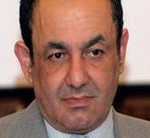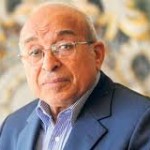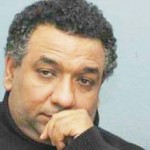The struggle for power between President Mohamed Morsy and the Supreme Council of Armed Forces (SCAF), in light of the former’s decision to reinstate the legally dissolved parliament, has been in the forefront of news analyses.
While some deny that the SCAF is willing to do anything beyond keeping its affairs independent from the intervention of other authorities, many argue that Morsy has started his gradual and calculated claim of his presidential validities from the SCAF.
The latter group is, however, divided as to the intents of Morsy and the Muslim Brotherhood, and whether the decision to revive the parliament is an attempt to seize control of the state, or a legitimate move to restore the president’s capacities.
The media has discussed the timing of Morsy’s visit to Saudi Arabia in light of the economic strife Egypt is enduring, and has tackled the intent behind the deliberate chaos aimed at making ordinary Egyptians scorn the revolution and accept military rule.

Meanwhile, liberal voices continue their criticism of the parochial Islamist interpretation of the term Shura in the newly drafted constitution and cast their anger towards controversial statements made by some Islamist preachers.
The President and the Military Council
Amr Al-Shobaki
Al-Masry Al-Youm
Amr Al-Shobaki reveals the core of the apparent political confrontation between the Supreme Council of Armed Forces and the Muslim Brotherhood, which has reached its peak following the decision of President Mohamed Morsy to cancel the SCAF’s validation of the court ruling to disband the parliament. He suggests that controlling the legislative authority has never been the aim of the SCAF.
Al-Shobaki’s analysis supposes that the SCAF possesses neither the will nor the capacity to effectively run the country in political terms.
If this were to be the case the junta could have easily appointed a military transitional president when Tahrir Square’s motto was once, ‘The Army and the People…One Hand!’ Their lack of initiative and creativity hindered them from speculating this option.
It is equally inaccurate to consider Morsy’s decision as a historical triumph over the SCAF – noting that the latter lacked the will to control the legislative authority. The SCAF’s reaction did not exceed a pale Mubarak-style statement, as anticipated by the Muslim Brotherhood.
Al-Shobaki rejects the calls by some liberal powers for the army to intervene and counteract Morsy’s decision. The generals will move when their interests, independence and privileges become threatened.
Morsy’s earthquake
Mohamed Salmawi
Al-Masry Al-Youm
Hours after president Morsy’s decision to reinstate the legally disbanded parliament, an earthquake has been recorded by the National Network of Seismic Research, whose magnitude reached 6.3 on the Richter scale, and whose epicenter was 33 kms deep below the Mediterranean Sea.
The earthquake affected the northern governorates of Egypt including the Delta and Greater Cairo.
Egyptians hardly felt this large-scale earthquake, and also failed to sense the extent of the political earthquake caused by Morsy’s interference in the decisions of the highest legal body in the country, the Supreme Constitutional Court.
This decision paves the way for Morsy to continue serving the interests of the Muslim Brotherhood at the expense of the nation.
A process he started by allowing the happy return of an illegal and dissolved Islamist-dominated People’s Assembly.
Apart from being an outright violation of the sanctity of the judicial system and the authority of all independent institutions, Morsy’s decision will further drown Egypt in a ‘power struggle’ between the Muslim Brotherhood and the military junta, as described by the BBC.
The development contravenes expectations that the president would end the political inconsistency that characterised the transitional period and affected all sectors of the Egyptian populace.

Reservations on the President’s trip
Fahmi Howeidi
Al-Shorouk News
Commenting on president Morsy’s planned trip to Saudi Arabia on 11July, Fahmi Howeidi expresses his reservation, and advises the president to postpone his travels.
Howeidi recalls the hostility expressed by the Gulf monarchies against the Arab Spring regimes in general, and the rise of the Muslim Brotherhood in particular, as illustrated by arrogant statements made by senior officials in the Gulf States.
The Gulf monarchs do not accept the idea of overthrowing a president after 30 years of rule, putting him on trial, and ultimately throwing him in jail. They have for so long benefited from the corrupt practices of Mubarak’s regime.
Egyptian State Security was deeply involved in the affairs of the Gulf region especially after a failed assassination attempt on Mubarak in1994 and in the aftermath of the 9/11 attacks. This explained the failure of the Gulf States to help their sister Egypt in its economic downturn.
Howeidi criticises the expression made by a Gulf statesman who said that the Egyptian president would come crawling to the Gulf seeking economic aid. As such, he urges Morsy to postpone his visit to Saudi Arabia until Egypt’s economy rises from its current setback and maintain Egypt’s position and pride.

About the struggle in Egypt
Ahdaf Suwaif
Al-Shorouk News
Before his ouster, the overthrown President Hosni Mubarak made the famous statement: ‘either myself or chaos’.
Ahdaf Suwaif sees that while Mubarak attempted to convince Egyptians and Westerners that he represented the only guarantor of control over a country chaotic by nature, the truth is that Mubarak and the remnants of his regime are exerting their maximum output to spread chaos in the country. This is a systematic strategy to make people blindly faithful to the idea that military rule is the only hope for them to work, earn, and be secure.
Suwaif recounts the military detainment of revolutionist activists in Suez which came shortly after widespread calls to free the civilians under military arrest. She gives examples of the hostility of the police and the military against civilians – hardly changed since the revolution. She criticises the Muslim Brotherhood’s vilification of those demonstrating in front of the presidential palace and their repeated canards of conspiracy.
Despite this dark picture, Suwaif believes in the nature of Egyptians, who accept the presence of evil and desire to contain it so as not to allow it to outweigh the good in the balance of life.

The Qaddafis write the constitution in Egypt
Wael Abdel-Fattah
Tahrir News
Amazed by the first clause of the draft post-revolution constitution, which calls Egypt a ‘Shura and modern state’, Wael Abdel-Fattah criticises the Islamist-dominated Constitutional Drafting Committee of being no different from the Qaddafis. He almost laughed when the Salafists who supported this clause explained to him that the term ‘Shura’ is the Islamic equivalent of ‘democracy’.
Abdel-Fattah sees this within the same context of Muammar Al-Qaddafi’s quest to locate a proper title for his state until he brilliantly founded the concept of the Jamahiriya which he regarded as the rule of the masses. Ultimately the Jamahiriya ended up being synonymous with the repressive rule of the individual dictator and his cohorts.
Abdel-Fattah challenges the Islamists to cite when precisely Shura was applied and how successful it was within the context of Islamic history. In totality he regards it as a smokescreen behind which to establish religious fascism in Egypt. The Islamists like Al-Qaddafi fail to make the distinction between rhetoric and reality.
Abdel-Fattah is surprised that in Libya, where Al-Qaddafi himself was born and bred, people made the move towards liberalism after being witnessing the actions of Islamists in Tunisia and Egypt, even if the Qaddafis are drafting the constitution!
A message from a cockroach
Farida Al-Shubashi
Al-WatanNews
In light of the statements made by the Islamist preacher Wadgi Ghoneim advising the president Morsy not to appoint a ‘crusader’ vice-president and urging him to squash any opposing voice with his shoes, Farida Al- Shubashi fires criticism against political Islamism.
Ghoneim described those who did not vote for Morsy in the presidential elections as cockroaches, rats, and dogs.
While Al-Shubashi predicts that voices will rise from within the Islamist movement condemning Ghoneim, she finds apologetic discourse insufficient, devoid of any deterrent action.
She considers Ghoneim’s statements an opportunity for all Islamophobes and anti-Islamists to mutilate and defame the image of Islam and condemns the lack of will to take appropriate measures against Ghoneim by political Islamists.
She recalls how she was fired and sued in France when she had refused to meet Shimon Peres, an Israeli war criminal, as she describes him, and abstained from channelling a statement by Salman Rushdie, author of Satanic Verses.
Considering herself as having a ‘cockroach’s endurance’ facing this unjust treatment, Al-Shubashi calls upon Ghoneim to cite examples whereby he has been forced to endure similar injustice.


